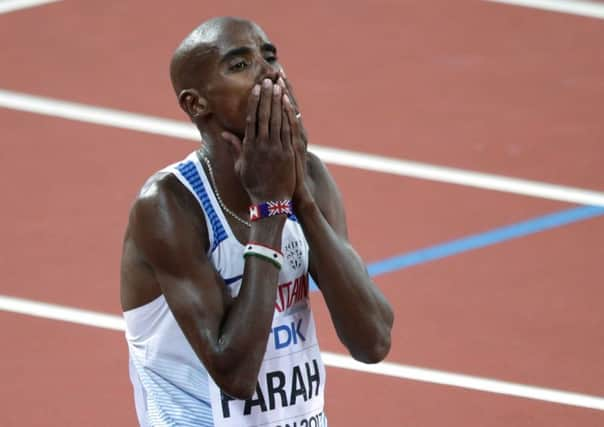Surprise silver lining for Farah's golden era


Farah, winner of 10 global gold medals, cried as he bowed out of track athletics in his home city, falling short of the perfect ending in the 5,000m final.
Bolt, 19-times a world or Olympic champion, cried in pain as cramp in his left hamstring set in and ruined his farewell leg of the 4x100m.
Advertisement
Hide AdAdvertisement
Hide AdFor two of the sport’s greatest champions, it was not how they had wanted it to end. But, in their moments of pain, their character showed.
“The best man won,” said a solemn Farah, paying credit to Ethopian Muktar Edris who had beaten him in a frantic final 400m as he went for a fifth straight long-distance double at major championships.
Bolt shunned the offer of a wheelchair on the home straight, gave a slight show of applause to the crowd and headed away. This time, it was not his moment.
Instead, it was Farah’s British team-mates CJ Ujah, Adam Gemili, Daniel Talbot and Nethaneel Mitchell-Blake, who had set the 13th fastest time in history to shock the world and win a memorable 4x100m gold medal.
Advertisement
Hide AdAdvertisement
Hide AdThe team’s success matched that of Britain’s sprint relay squad from the 2004 Athens Olympics, but it was arguably more impressive given the perfectly executed changeovers and European record of 37.47 – a world’s best for 2017.
“This is the best feeling in the world,” said Gemili, a former semi-professional footballer who only took up sprinting in 2011.
Talbot, who alongside Gemili was part of the 4x100m squad that was disqualified at London 2012, added: “I think the public have probably heard enough about us being the best generation of sprinting, with no results. So it’s nice we came here in front of our home crowd and did exactly what we thought we could.
“We had so much self-belief; we didn’t come here to just get on the podium, we came to win and that’s what we did.”
Advertisement
Hide AdAdvertisement
Hide AdBritish fans had waited eight days for a second medal at the home World Championships following a succession of near misses. Laura Muir, Dina Asher-Smith, Kyle Langford, Callum Hawkins and Mitchell-Blake had all finished fourth in events, and early on Saturday night Katarina Johnson-Thomson and Morgan Lake finished fifth and sixth respectively in the women’s high jump.
But, in the space of 40 minutes, the acquisition of three medals surely eased concerns over budgets and talent pools as the women’s sprint relay added silver between Farah’s farewell and the men’s 4x100m gold.
At London 2012, Farah’s moment had dropped the curtain on a historic treble on Super Saturday. But he was the warm-up act on his goodbye tour this time around. As for Bolt seven days before him, a planned fanfare on the track had to be conducted after a sober competitive ending.
Stunned silence, followed by boos, had greeted the realisation Bolt would leave athletics without an individual gold from London as twice-shamed Justin Gatlin pipped him to 100m gold the previous Saturday.
Advertisement
Hide AdAdvertisement
Hide AdThis time, there was no pantomime involving a hero and a villain. Instead, the force Farah has been battling his whole career re-emerged.
He has been motivated throughout by the desire to break the Ethiopian stranglehold imposed on long distance running during two decades that were dominated by Haile Gebrselassie and Kenenisa Bekele.
Four Olympic gold medals and six world titles over a six-year period are proof he met his goal. But he was forced to hear the sound of March Forward, Dear Mother Ethiopia, the Ethiopian national anthem, once again after a slowly contested 5,000m final.
As he has done so often, Farah controlled the pace at the front of the pack as his rivals changed tack from the aggressive 10,000m on the opening day of the championships. This time, the tactics worked and Edris, who had not run the 10,000m, left Farah trailing at the bell and carved out a gap the Briton could not close despite a typically battling show down the home straight.
Advertisement
Hide AdAdvertisement
Hide Ad“I gave 110 per cent,” Farah said. “I don’t think there was anything more I could do.”
The four-time Olympic champion added: “I had tears in my eyes, I’ve never had that before. It’s been an amazing journey. To end it in London, where it all started, I got a bit emotional.
“If I had it perfect it would have been nice to end in double double, but anything is possible. At some point it has to come to an end.”
Britain’s women took on the baton for the brooding crowd as the quartet of Asher-Smith, Asha Philip, Desiree Henry and Daryll Neita claimed a close-run silver behind an American team featuring six-time Olympic gold medallist Allyson Felix.
Advertisement
Hide AdAdvertisement
Hide AdA late first changeover between Philip and Asher-Smith raised a few scares, but Neita brought the quartet home in 42.12secs, three tenths behind the Americans.
The men’s relay was supposed to [provide Bolt’s glorious ending.
But that did not faze the British quartet, whose baton transitions were seamless. As Bolt pulled up, Mitchell-Blake was already away on the final leg and he overtook 100m silver medallist Christian Coleman to seal a historic, and much-needed, triumph.
It provided a remarkable juxtaposition for the disbelieving crowd, of British hope and glory and the painful ending of a great era.